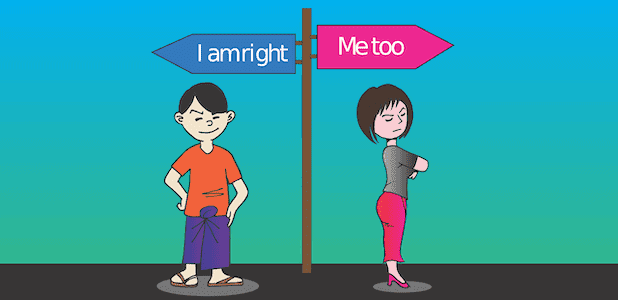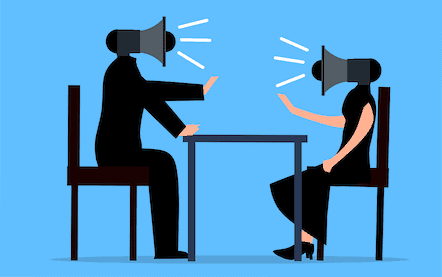7 Conflict Resolution Techniques for Couples

Have you ever found yourself in a heated argument with your partner, wondering how it escalated so quickly?
Conflicts are natural when you share significant time and space with another person. Relationship conflict arises when your interests, preferences or beliefs don’t align. If not handled properly, a minor disagreement can turn into an argument. And, when people feel angry and strong emotions kick in, a fight is not far behind, making the whole problem worse. The skill of resolving conflict plays an important role and is invaluable for a healthy long-term relationship.
This process is based on several ideas, including self-expression without fear of judgement, a genuine interest in each other’s points of view and endless care about your partner’s feelings, needs and preferences. You may discover that once you know how to solve conflicts and handle disagreements effectively, arguing will become less frequent, you will have less stress and have the energy to focus on things that matter.
This article aims to equip you with effective techniques and strategies, ensuring that once your conflicts are resolved, you and your partner emerge from disagreements closer and more understanding than before.
So, if you’re ready to turn conflict into a tool for strengthening your relationship, read on to discover how to resolve disagreements in a healthy and constructive way.
Understanding Conflict in Relationships

Conflict is an inevitable aspect of any close relationship. It arises from differences in opinions, desires, values or beliefs between people who care deeply about each other.
In the context of a romantic relationship, these disagreements can stem from a variety of sources, including financial decisions, household responsibilities, lifestyle choices, and even the minutiae of daily life.
What’s important to remember is that conflict, in itself, is not a sign of a failing relationship but a natural outcome of two unique individuals trying to find harmony as they share their lives together.
The Role of Conflict
Contrary to what many believe, conflict plays an important role in romantic relationships. It allows a partner to identify their needs and help each other fulfil them.
However, the difference between constructive and destructive conflict lies in how it’s managed.
Constructive conflict can lead to improved problem-solving, stronger bonds, and increased intimacy, as it encourages partners to confront and resolve underlying issues.
Common Sources of Conflict
Recognising the common sources of relationship conflict can help couples develop strategies to address them as soon as they arise. People disagree for many reasons and within a romantic relationship, this often includes:
- Financial pressures or disagreements over spending and saving habits.
- Differences in libido or sexual desires.
- Varied expectations about household responsibilities or parenting styles.
- External sources of stress, such as job pressures or issues with extended family.
Impact of Unresolved Conflict
When a conflict is not resolved, it can lead to a breakdown in communication, decreased emotional intimacy and unnecessary stress.
Instead of looking for an agreement through healthy conflict resolution, you may find yourself in opposition to your partner’s ideas. In turn, your partner is likely to take a defensive position, fighting against you to protect their interests.
Over time, these unresolved issues can accumulate, leading to a significant strain between partners. Addressing disagreements and conflicts as they arise is pivotal in maintaining a healthy and successful relationship.
Foundations of Effective Conflict Resolution

Think back to the last disagreement you had with your partner.
Did it feel like you were both speaking different languages? It’s a common feeling when emotions like fear and anger run high, and understanding seems out of reach.
But imagine if you had a toolkit at your disposal, one that could bridge that gap and turn a potential argument into a moment of connection. This is where effective conflict resolution comes into play.
Communication is Key
Effective communication where partners feel comfortable to speak their truth is a first step towards conflict resolution.
This process is about more than just talking; it’s about connecting, understanding, and empathizing with your partner. It involves both speaking and listening with the intent to understand, not just to respond.
Be mindful of your words, your tone, and how your message might be received.
Active listening is a vital component of communication, especially when resolving conflicts. Here are a few tips:
- Give your full attention to your partner
- Acknowledging their feelings
- Respond in a way that will leave them feeling heard and understood.
- Summarise what your partner has said
- Ask clarifying questions
Remember to demonstrate your interest by showing that you’re engaged and invested in coming to an agreement and finding a solution together.
Discover the key to improving your communication with our workbook, “How to Communicate Better with Your Partner“.
Expressing Feelings Without Assigning Blame
When emotions are involved, it’s easy to slip into a pattern of blaming the other person for how we feel.
However, a more constructive approach is to express feelings using “I” statements. For example, instead of saying, “You make me so angry,” try, “I feel upset when this happens because…”
This method helps in communicating your emotions without making your partner defensive, paving the way for a more productive conversation.
Recognizing the Role of Body Language
Our bodies often speak louder than our words. In a conflict situation, your body language can either escalate or de-escalate tensions. Maintaining an open demeanour by uncrossing your arms, making eye contact, and nodding signals to your partner that you’re open to their perspective and committed to resolving the conflict. Conversely, a closed or aggressive predisposition can hinder communication and exacerbate the situation.
As we dive deeper into strategies and techniques to resolve conflict effectively, remember that these fundamental skills are like muscles, the more you use them, the stronger and more effective they become.
Techniques for Resolving Conflict

Now that we’ve established the importance of communication and body language, let’s dive into specific techniques that can help you and your partner navigate through conflicts more effectively. Each strategy offers a pathway to not just resolve arguments but to deepen your relationship in the process.
1. Avoiding Conflict Isn’t the Solution
While it might seem easier to avoid conflict altogether to save face or keep the peace, this approach often leads to unresolved issues simmering beneath the surface. According to Cambridge University Press, avoiding conflict can actually exacerbate relationship problems in the long run.
2. Avoid Escalation: Stay Calm and Focused
One of the first steps in managing conflict is to avoid escalation. Conflicts often intensify when strong emotions take the lead, pushing rational discussion to the sidelines.
The key is to keep calm and focus on the issue at hand, avoiding personal attacks or unrelated grievances. Try the following to help you maintain a level-headed discussion:
- Taking deep breaths
- Pause before responding
- Take a short break if necessary
3. Find Common Ground Through Negotiation and Compromise
When faced with a conflict, negotiation and compromise are crucial for finding a solution that works for everyone.
This doesn’t mean one person always has to give in; rather, it’s about exploring different options together and agreeing on a course of action that respects both of your needs and interests.
Remember, the goal is not to “win” the argument but to resolve the conflict in a way that strengthens your bond.
4. See Their Perspective with Empathy and Understanding
Empathy plays an important role in resolving conflicts. Trying to see the situation from your partner’s perspective can offer invaluable insights into their feelings and motivations.
Ask questions to understand their viewpoint better and validate their feelings, even if you don’t agree with them.
This act of empathy can significantly reduce tension and lead to more amicable solutions.
5. Use “I” Statements and Avoiding Blame
As mentioned earlier, expressing your feelings with “I” statements rather than assigning blame is essential for healthy communication.
This technique helps you take responsibility for your feelings and reduces defensiveness in the other party.
By focusing on your feelings and needs, you create a space for open dialogue free from judgment and blame.
6. Actively Listen
Resolving conflict in a loving and caring way requires you to be fully present. I cannot stress enough the importance of active listening in resolving conflicts.
Truly listening to your partner, without interrupting or planning your rebuttal, shows that you genuinely care about their point of view and are willing to come to an agreement.
7. Address the Real Issue
Often, what starts as a small disagreement can escalate into a heated argument because the underlying issue isn’t being addressed.
Identifying and focusing on the core problem, rather than getting sidetracked by minor irritations, is crucial. This requires honest reflection and sometimes digging deeper into what’s truly bothering you or your partner.
Having these techniques in your conflict resolution toolkit, you and your partner can navigate every disagreement with grace and empathy, turning conflicts into opportunities for growth and deeper connection.
Remember, the goal is to resolve conflict in a healthy way, ensuring that both partners feel heard, understood, and valued.
Applying Conflict Resolution in Different Situations

Conflict in relationships can manifest in various forms, from minor disagreements to significant disputes. Knowing how to apply conflict resolution techniques across different situations can help you create healthier interactions. Let’s explore how to navigate these challenges and master conflict resolution.
Financial Decision Making
Financial issues are a common source of tension in relationships, often requiring careful planning and decision-making.
When you disagree over budgeting, spending, or saving, it’s important to share your perspective and understand your interests and priorities.
Aim to work together rather than in opposition, focusing on long-term financial health.
Lifestyle Choices
Differences in lifestyle choices, such as diet, hobbies, or social activities, can cause conflict situations. Sometimes, it can be challenging to balance individual preferences with the interests of the relationship.
Try to understand the reasons behind your choices. By focusing on finding a middle ground or creating room to consider each person’s interests, couples can avoid conflict and reach an agreement in no time.
External Stressors
External pressures, such as job stress or issues with co-workers, can also impact relationships. Drawing on principles of organizational behaviour can be beneficial in these instances.
It’s crucial to support each other, offering a safe space to vent frustrations without it turning into a blame game.
Effective conflict resolution in this context means not letting external stress make the problem worse but instead helping each other find healthy ways to manage stress and maintain a strong emotional connection.
Strong Emotions like Anger and Fear
Situations that evoke strong emotions, like anger or fear, require special attention.
Feelings of opposition or the fear of losing face can intensify these emotions, making it harder to speak clearly and resolve disputes.
Techniques such as taking a pause to cool down, practising mindfulness to keep calm, and expressing emotions in a controlled manner can help manage these intense emotions.
It’s also helpful to recognize when to take a step back from arguing to prevent the situation from escalating and to approach the discussion with a clearer mind later.
Long-Standing Disagreements
Some conflicts may be rooted in long-standing disagreements or differences in core beliefs. In these instances, focusing on the bigger picture of what you both value in the relationship can guide you toward finding an agreement.
It might not always be possible to solve every difference, but you can reach an agreement on how to respect and accommodate each other’s positions.
This often involves letting go of the need to be right and prioritizing your well-being and the health of the relationship over winning an argument.
Everyday Disagreements
In daily life, minor disputes can quickly turn into major conflicts if not handled properly. Learning to pick your battles, focusing on things that matter, and sometimes agreeing to disagree can prevent turning an argument into a full-blown fight.
Remember, the goal is to maintain healthy relationships, not to prove a point or win an argument.
By applying these conflict resolution techniques to various situations within a romantic relationship, you can navigate conflict situations with empathy and respect.
While people disagree and feel angry, the way these emotions and disputes are handled can either strengthen the bond or lead to further issues. The ultimate aim is to create an environment where both partners feel valued, heard, and connected.
Couples Coaching for Conflict Resolution

Have you ever wondered why, despite your best efforts, some conflicts in your relationship seem impossible to resolve? You’re not alone.
Many couples find themselves circling back to the same arguments, unable to break the cycle. This is where the expertise of a couples coach can make a significant difference by helping mediate disputes and offering an objective perspective that helps both partners see beyond their subjective viewpoints. This can be especially beneficial in situations where emotions run high, and it’s difficult to remain objective.
The ultimate goal of couples coaching is not just to resolve existing conflicts but to equip you with the skills needed for a healthy and successful relationship.
Remember, seeking help is a sign of commitment to your relationship’s health and success. Don’t wait for the problem to become worse; take the step towards a healthier, happier relationship today.
Example of a Couple Resolving a Conflict
Alex and Jamie, struggling with recurring arguments over household chores, sought the assistance of a relationship coach to navigate their conflict. Through the coach’s guidance on effective communication and active listening, they learned to express their needs and feelings constructively, without assigning blame.
The coach helped them devise a shared task calendar and establish regular check-ins, enabling them to address their immediate disagreement and prevent future conflicts from escalating.
This experience not only resolved their issue but also gave them essential conflict-resolution strategies they can now apply to other aspects of their relationship and their personal lives.
Having the strategies needed to navigate conflict resolution more effectively allows partners to develop healthier relationships both romantic and social.
Conclusion
As we reach the end of our exploration into conflict resolution techniques for couples, it’s clear that resolving conflict is not just about finding a quick fix to a current argument. Instead, it’s an extensive process that involves considering both parties’ interests, communicating effectively, and working together towards an agreement.
With these top conflict resolution techniques for couples, you no longer need to fear relationship conflict. Having these tools will help you resolve conflict with grace and respect for the person in front of you.
Main Takeaways
- Effective Communication is Key: Aim to understand your partner’s position, share your own perspectives, and try to reach an agreement. Remember, words matter, and how you express your ideas can significantly impact your ability to resolve conflict. This process involves actively listening to the other party, managing your anger or stress, and finding common ground.
- Managing Emotions: Learning to manage emotions like anger and fear will help you to stay emotionally balanced and focus on resolving your current conflict. In moments of disagreement, it’s crucial to stay calm and handle conflict in a healthy way. By maintaining composure, you can think more clearly and work towards resolving the issue without escalating it to a fight.
- Consider Each Other: handle conflict in a healthy way, focusing on resolving the issue rather than winning the argument. By considering each other’s positions and interests, you can work towards a solution that fulfils both parties’ needs. Effective negotiation is part of a conflict resolution process. This doesn’t mean giving in on every issue but finding solutions that respect each person’s interests and contribute to a successful relationship.
- Recognise Differences: Acknowledge and respect the beliefs and interests of every person. Appreciating differences is key to managing disputes in any conflict situation.
- Seek Professional Help: Sometimes, resolving conflict requires external support. Couples coaching can offer new insights and strategies for managing conflict, helping you to resolve arguments in a healthy way. Coaches provide tools for managing strong emotions, and strategies for decision-making principles for a successful conflict resolution and offer a fresh perspective on how to approach and resolve conflicts in a loving way where everyone’s needs are fulfilled.
The Bigger Picture
Conflict is a natural part of relationships, but how you handle these disagreements can significantly impact your relationship’s health and longevity. Remember, the goal of conflict resolution isn’t to eliminate conflict entirely but to learn how to handle it constructively.
The key is not to avoid conflict but to learn how to navigate through it together. Having the skills to resolve conflict, you can prevent minor disagreements from escalating into larger fights, ensuring that both your feelings and needs are respected and valued.
As you continue to practice these techniques, you’ll find that not only do your conflict resolution skills improve, but your relationship as a whole becomes more joyful and fulfilling.
If you’d like to explore the current state of your relationship, our workbook “How Healthy Is Your Relationship?” will help you get started.
Integrating Conflict Resolution into Daily Life
Resolving conflict is more than just a skill—it’s a commitment to maintaining a healthy, dynamic relationship where both parties feel heard, valued, and understood. It involves recognizing when to speak up and when to listen, recognising when to hold your ground and when to compromise. The ultimate goal is not to eliminate conflict but to learn how to resolve it in a way that enriches your relationship.
Frequently Asked Questions about Conflict Resolution
What are the 5 conflict resolution strategies?
The five conflict resolution strategies are compromising, collaborating, avoiding, competing, and accommodating. Compromising involves finding a middle ground where each person concedes some points of opinion to reach an agreement. Collaborating seeks a win-win scenario, combining ideas from both parties to solve the issue comprehensively. Avoiding is when people decide to save face by not addressing the conflict directly, sometimes to prevent the problem from getting worse. Competing is a more aggressive approach, where one aims to win the argument, often leading to a struggle. Lastly, accommodating involves one party giving in to the other’s demands, often to maintain peace or resolve the conflict swiftly.
How do you handle conflict with your partner?
Handling conflict with your partner requires empathy, effective communication, and a commitment to resolve disagreements in a healthy way. Start by actively listening to your partner’s position and feelings, showing that you value their perspective. Use “I” statements to express your opinions and emotions without blaming them. Seek to understand their interests and matters that are important to them. It’s essential to speak openly about your needs and look for solutions that respect both parties. Negotiation and compromise can help find an agreement that satisfies both of you, aiming to strengthen your relationship without leading to fights.
What are 3 strategies to use when resolving conflict in relationships?
Three effective strategies for resolving conflict in relationships include active listening, empathy, and compromise. Active listening involves giving your full attention to your partner, speaking in turn, and validating their opinions. Empathy requires putting yourself in your partner’s shoes to understand their position and feelings, reducing anger and struggle. Compromise entails working together to find solutions that meet both parties’ interests, ensuring that the outcome is fair and respecting each person’s opinion.
How do you solve a relationship without breaking up?
To solve issues in a relationship without breaking up, focus on open and honest communication, mutual respect, and willingness to adapt. Discuss your concerns and feelings without assigning blame, and listen to your partner’s opinions and ideas. Working together to identify the underlying differences and disputes can reveal common interests and goals. Use negotiation to find solutions that satisfy both parties. Remember, maintaining a healthy relationship often involves changing lifestyles or habits to accommodate each other’s needs.
What is a conflict with an example?
A conflict is a disagreement or argument between parties with opposing opinions, beliefs, or interests. For example, a couple might disagree on financial spending habits; one person prefers saving for future security, while the other values spending on life experiences. This difference in opinions leads to a conflict that requires resolution through understanding, communication, and compromise.






